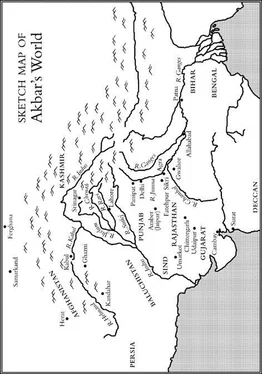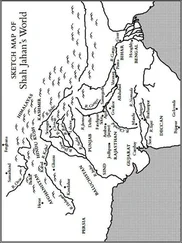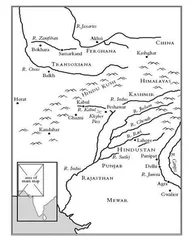Alex Rutherford - Ruler of the World
Здесь есть возможность читать онлайн «Alex Rutherford - Ruler of the World» весь текст электронной книги совершенно бесплатно (целиком полную версию без сокращений). В некоторых случаях можно слушать аудио, скачать через торрент в формате fb2 и присутствует краткое содержание. Жанр: Исторические приключения, на английском языке. Описание произведения, (предисловие) а так же отзывы посетителей доступны на портале библиотеки ЛибКат.
- Название:Ruler of the World
- Автор:
- Жанр:
- Год:неизвестен
- ISBN:нет данных
- Рейтинг книги:3 / 5. Голосов: 1
-
Избранное:Добавить в избранное
- Отзывы:
-
Ваша оценка:
- 60
- 1
- 2
- 3
- 4
- 5
Ruler of the World: краткое содержание, описание и аннотация
Предлагаем к чтению аннотацию, описание, краткое содержание или предисловие (зависит от того, что написал сам автор книги «Ruler of the World»). Если вы не нашли необходимую информацию о книге — напишите в комментариях, мы постараемся отыскать её.
Ruler of the World — читать онлайн бесплатно полную книгу (весь текст) целиком
Ниже представлен текст книги, разбитый по страницам. Система сохранения места последней прочитанной страницы, позволяет с удобством читать онлайн бесплатно книгу «Ruler of the World», без необходимости каждый раз заново искать на чём Вы остановились. Поставьте закладку, и сможете в любой момент перейти на страницу, на которой закончили чтение.
Интервал:
Закладка:
Timur’s tactics might not be appropriate for dealing with a modern enemy like Rana Udai Singh, equipped with cannon and entrenched behind the high walls of his desert fortress, Akbar thought. But Timur’s self-belief, his absolute determination to win and never to cede the initiative or be deflected from his goals, were as relevant now as two hundred years ago. The desire to emulate his warrior ancestor sent a restless energy burning through Akbar’s veins so that he could hardly lie still beneath the hakim ’s strong fingers. But it would not be long before the war drums boomed out from the gatehouse of the Agra fort and the Moghul armies advanced southwest into the pale orange deserts of Rajasthan towards Mewar and its arrogant rana. His mother had conjured those deserts for him so vividly that Akbar could almost taste the dry, gritty air and hear the harsh shrieks of the peacocks that inhabited these desolate reaches. It was not surprising Hamida should remember them so well. She had given birth to Akbar in a small desert town in Rajasthan while she and his father had been fugitives from a Rajput king who had pledged to rip Akbar living from her womb and send the unborn child as a gift to Sher Shah, the invader who had robbed Humayun of his throne.
That Rajput leader was dead, but the humbling of Udai Singh was long overdue and subduing Mewar, which straddled the route between Agra and the south, made sound strategic sense. In his mind’s eye, Akbar already saw his armies battering down the gates of the great fort of Chittorgarh, capital of Udai Singh’s family for over eight hundred years and symbol of their overweening arrogance. Defeating Udai Singh, head of the most powerful Rajput ruling house, would make Akbar so feared — and respected — across the Indian subcontinent that none would dare challenge him.
Chapter 7
In the early morning of a cloudless December day Akbar stood with Ahmed Khan at his side looking towards the Rana of Mewar’s great fortress-city of Chittorgarh. Its sandstone walls, over three miles long, sat high on a vast rocky outcrop soaring five hundred feet sheer from the dry Rajasthani plains below. Enclosed within them were temples, palaces, houses and markets, as well as military positions.
To Akbar’s acute frustration, he and his forces had already been besieging the city for six weeks to no great effect. Initially he had been pleased with the progress they had made. They had surrounded Chittorgarh completely, cut off all food supplies and captured or killed any foraging parties the Rajputs had sent out. They had gleaned some useful information from one of their captives, a ragged scrawny child of about ten whom they had apprehended with his two elder brothers as they climbed down the exposed rock face from the fortress’s outer walls in a desperate search for food. When Akbar’s soldiers had separated the child from his brothers and tempted him with a piece of freshly roasted mutton he had told them, after much cajoling, that Rana Udai Singh did not command the defending army himself but had appointed two of his young generals — Jai Mal and Patti by name — to the task. The rana himself, according to the boy, was somewhere in the Aravalli range of hills where he was said to be building a new capital to be named Udaipur after him.
The reaction of his older brothers when they had found out from the child what he had revealed underlined the strictness of the Rajput code. They had attacked the boy and would have strangled him if they had not been pulled away. They had repeated their assault the next day, when the three of them had been put to work with some other captives breaking and moving stone to be used in improving Akbar’s positions. This time, the eldest of the three had hit his brother with a sharp stone, inflicting a great gash to the side of his head. As he was hauled from his bleeding victim he had yelled at him, ‘You gave information to the infidel attacker. You are no longer my brother. You are not even a Rajput any more.’
When Akbar had heard this story, he had ordered the child to be cleaned up, clothed and put to work in the camp kitchen, remarking as he did so that it was a fitting fate for one whose desire for food had led him to help Chittorgarh’s attackers. However, the boy could not be persuaded to reveal anything about any secret routes into Chittorgarh. Nor would older captives, even when subjected to rough questioning and threatened with torture. Probably there were none.
Akbar and his generals had continued the assault, but his early hopes of success had faltered. He had ordered barrages of cannon shot to be followed up by wave after wave of attacks, attempting to charge up the single five-hundred-yard-long winding ramp leading from the plain to the city’s main gateway, which was situated at the lowest point of the summit of the outcrop. But none of the attackers had even got as far as the bottom of the ramp. As soon as his soldiers had begun to ride and run towards the ramp, Akbar had been forced to watch powerless as orange-turbaned Rajputs, oblivious of cannon and musket shot, had appeared on Chittorgarh’s crenellated ramparts and shot down the Moghuls with musket balls, crossbow bolts and a storm of hissing arrows. Men and horses had fallen dead or wounded, many on the exposed ground in front of the fortress. To Akbar’s dismay, more of his men had been killed as they bravely rushed out to attempt to drag wounded comrades back under cover.
Eventually so many lives had been lost in such rescue attempts that Akbar had reluctantly ordered his officers only to permit them under cover of darkness. Even then, the Rajputs had killed or wounded many, so good seemed to be their hearing and vision in the moonlight. During the days following these attacks, Akbar and his soldiers were tormented by the sounds of their wounded fellows crying out for help, for water, and, in the last extremities, for their mothers and for God to release them from their agonies. The constant neighing of wounded horses was almost as pitiful. Black flies bloated from feeding on the corpses clustered everywhere and the smell from the putrescent bodies of both men and animals so polluted the air around Akbar’s camp that he had ordered fires of sandalwood to be kept burning constantly in an only partially successful attempt to mask the sweet, stomach-turning stench of decay.
Determined not to be beaten, Akbar had made rounds of his vast camp morning and evening to encourage his men. He had ordered small mounds or barricades of mud and stone to be thrown up at night to provide cover for rushes by day at the walls. However, though picked bodies of men had got near to the base of the ramp they had been unable to make any further progress and had been forced to retreat again, dodging back behind the mounds and dragging with them those wounded they could.
Even now, as Akbar watched, a number of his best troops were assembling for yet another attack on the ramp leading up to Chittorgarh’s gate. This time he and his commanders had decided war elephants would lead the assault. Soldiers were already climbing into the howdahs on the animals’ backs. To improve the chances of success, he had had the elephants fitted with coats of thicker than normal overlapping steel plates. The howdahs had been strengthened with heavy planking to give extra cover to the musketeers and archers within. Once their howdahs were full, the mahouts sitting behind the elephants’ ears tapped the beasts as a signal for them to rise, which they did ponderously beneath the weight of their extra armour and the reinforced howdahs and their occupants. Around them, the foot soldiers and horsemen who were to follow them into the assault were also forming up, taking advantage of what shelter the mud and stone barricades provided. The cavalrymen’s horses were tossing their heads and skittering uneasily, sensing their riders’ tension about the attack to come.
Читать дальшеИнтервал:
Закладка:
Похожие книги на «Ruler of the World»
Представляем Вашему вниманию похожие книги на «Ruler of the World» списком для выбора. Мы отобрали схожую по названию и смыслу литературу в надежде предоставить читателям больше вариантов отыскать новые, интересные, ещё непрочитанные произведения.
Обсуждение, отзывы о книге «Ruler of the World» и просто собственные мнения читателей. Оставьте ваши комментарии, напишите, что Вы думаете о произведении, его смысле или главных героях. Укажите что конкретно понравилось, а что нет, и почему Вы так считаете.












